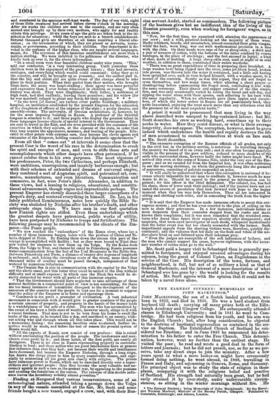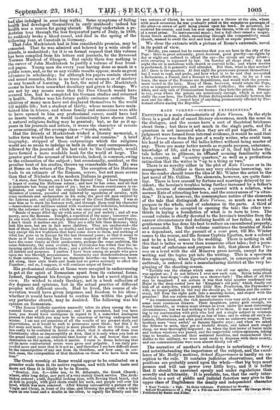THE EARNEST STUDENT: MEMORIALS OF
JOHN MACKINTOSH.* Jon zi 3fAcrazrosE, the son of a Scotch landed gentleman, vas born in 1822, and died in 1851. He was a hard student froni boyhood till death ; carrying off many prizes both at the Edin- burgh Academy and Glasgow College. He subsequently attended classes in Edinburgh University ; and in 1841 he went to Cam- bridge. He had been religious from his youth, and his aim was the English Church ; but, after long consideration, he objected to the doctrine of baptismal regeneration as contained in the ser- vice on Baptism. The Established Church of Scotland he con- sidered too Erastian ; and in June 1843 he announced his deter- mination to his father to enter the Free Church. This determi- nation, however, went no further than the earliest stage. Be visited the poor ; he read and wrote a good deal in the form of letters and journals ; but he did not preach, nor, so far as we per- ceive, take any direct steps to join the ministry. After a few years spent in what a mere looker-on might have erroneously termed doing nothing, he went 'abroad, in 1848, travelling in France and Italy, and sojourning in Geneva, Rome, and Germany. His principal object was to study the state of religion in those places, comparing it with the • religious belief and practice of Scotland. The strength had naturally been great, but he Mid early strained it by over-study, under unfavourable circnin- stances, as sitting in the winter mornings without fire. He The Earnest Student: being Memorials ofJohn Mackintosh. By the Rever- end Norman Macleod, Minister of the Barony Parish, Glasgow. Published. by Constable, Edinburgh; and Adams, London. indidged in over-long walks. Some symptoms of failing health had developed themselves in early manhood ; indeed his. health was a reason for going abroad. Having' Undertaken a pe- destrian tour through the less frequented 'parts of -Italy, in 1860, he suddenly broke a blood-vessel, and died in the spring of the
following year, at Canstadt in Germany. That John Mackintosh had in him considerable promise, may be conceded. That he was admired and beloved by a wide circle of friends, is undoubted ; for it is on formal request that this volume has been compiled from his letters and journals, by the Reverend Norman Macleod of Glasgow. But surely there was nothing in the career of John Mackintosh to justify a volume of four hund- red ,pages. Young men die every year having done as much in a public sense, and, so far as any visible results appear, made as great advances in scholarship ; for although his papers contain shrewd and sound remarks, there is no trace of rare acumen or of mastery in any branch of learning. In fact, the mind of Mr. Mackintosh seems to have been somewhat desultory and given to change. We are not by any means sure that the Free Church would have secured him, had he completed his German studies and returned in health. Neither was his future public eminence certain. The abilities of many men have not displayed themselves to the world till middle life ; but a student of thirty, whose means have main- tained him in leisure, and whose family and connexions were able to have opened to him any professional career, could have had no innate vocation, or it would instinctively have shown itself. A natural religious feeling may be granted ; but, so far as it ap- pears in his journals and letters, it wears the character of reverie or sermonizing, of the average class—" words, words."
Had the friends of Mackintosh wished a literary memorial, a better form would have been that of "life and remains." A brief biography, stripped of those outpourings which the religious world are so prone to indulge in both in diary and correspondence, followed by the journal of his last visit to the Continent, would have formed a more readable book for the world at large. The greater part of the account of his travels, indeed, is common, owing to the exhaustion of the subject ; but occasionally, accident, or the peculiar bent of his studies throws up remarkable facts. He was at Rome on the return of the Pope. The reception of his Holiness leads to an estimate of the Romans, severe, but not more severe
than that of Niebuhr on the modern Italians in general.
"a stave, dear Norman, ere I leave the Eternal City. I have lingered on in hopes of seeing his Holiness return ; and now he has come, and all that is inanimate has hung out signs of joy ; but no Roman countenance is en- lightened, nor aught but the utmost indifference expressed. Amid the thunders of cannon, preceded and followed by squadrons of cavalry, with some cardinals and ambassadors in his suite, the good old man entered by the Lateran gate, and alighted at the Steps of the Great Basilikos. I was so near him as to mark his features well, and through them read his character —benevolence and mildness united with weakness and indecision, betokening little the reformer of his age, which he was once given out to be. "Bands of music filled the air with notes of joy and melody ; and all was merry, save the Romans. Tonight, a repetition of the same ; tomorrow also. In one word, all classes are deeply discontented; but for the Pope and Popery, I-don't think it matters one jot. They are a silly folk these B,' °mans ; they leek like men, but are in fact mere children, they are uneducated—the best of them, (not their fault, no doubt,) and know nothing of their own his- tory except the few traditions that have come down to them, and nothing of what has gone on in Europe for the last thousand years; so that it seems to them as if but yesterday the Ciesars were masters of the universe. They have the same vanity as their predecessors, perhaps the same ambition, the same dishonesty, the same avaricb; but Providence has willed that the in- ferming spirit should forsake them ; and a pitiable set they are, therefore, to all intents and purposes. I confess I have been among no people who grew upon me less through acquaintance. Generosity and disinterestedness seem to them unknown. They have no domestic hearths—no home—no heart. All along, their civic broils and feuds had no power seriously to affect the Popedom ; and so, I suppose, it will continue usque ad fineni."
Ills professional studies at Rome were occupied in endeavouring to get at the spirit of Romanism apart from its external forms. Indeed, throughout his foreign sojourns he had a novel object in view. He wished to study theology, not in a book collection of dry dogmas and opinions, but in the actual practice of different peoples with different creeds. Had he lived, this course of ob- servation would have given largeness and freedom to his ideas ; whether it would have tended to confine him within the pale of any particular church, may be doubted. The following was his opinion on Romanism.
The Roman Catholic question assuredly takes its place among the re- nascent forms of religious opinions; and I am persuaded, had you been here, you would have undergone in regard to it a somewhat analogous process to that which you may now be conscious of having undergone last winter.I am not yet conscious of all the results of my present study and observations, so it would be rash to pronounce upon them; but this I do feel more and more, that Popery is more plausible than we think it, and less easily to be confuted in detail—in short, that it shades off from true Christianity often so imperceptibly at first, that it is only when you look at the grand result you can entertain that horror of it, and bestow that con- demnation on the system, which it merits. I came to Rome believing that all its more controverted errors were gross and palpable. I am daily per- suaded more and more that it is not so • and therefore I see how difficult must be the emancipation of any one from its thraldom, and how easy, in cer- tain oases, the reimposition of that thraldom on those who have been born free."
The Greek worship at Rome would appear to be conducted on a grander scale than in its native regions, and with better taste and
more art than it is likely to be in Russia.
"Sunday, Jan. 6.—After ten, to St. Athanasia, the Greek Church ; where, after long delay, saw part of a very stately Greek service. The Arch- bishop entered ; atoll, dignified-looking man, with flowing black beard, clad at first in purple, with gold chain round his neck, and purple veil over his head, which was soon removed. After kissing successively a picture of the Virgin and Christ, in front of the altar, and blessing the people with a triple taper in one hand and:a double in the other, to signify the Trinity and the two natures of Christ, he took his seat upon a throne at the side, where with much reverence he waa gradually robed in the.auniptoolis garinentaof the altar.-1-it crown of gold being placed upon his head ,.So accoutred,. he received his crosier, and:took his seat upon the throne, with all the dignity-- of n royal priest: No instrumental music; .but a full choir mised a =gm- ficent Greek anthem, which, resounding hrough, the .comparatively small church, seemed to swell the soul and bear it aloft on angela' pinions."
We close the extracts with a picture of Rome's externals, novel in its point of view.
"Briefly, you cannot but be conscious that you are here in the city of the Pope : there is great solemnity, great decorum, great gravity—no sights by day or night are suffered to offend the eye—the streets are early silent— even swearing is repressed by law. On Sunday all shops shut ; day and night the air is melodious with church or convent belle; and where service is performed, it is generally well attended. But then, what is that service? Ah ! there is the question. At first sight the grossnesses present themselves but I want to read, and probe' and hear what is to be said that reconciled. a Bellarmine, a Pascal, and aBossuet to what offends me. As far as I can learn, the mass of the Romans are Republicans, and would wish the govern- ment vested in the laity. Many of those, however,. would retain the Pope, even as temporal sovereign, and are stanch Catholics' the others are in- fidels, and only talk of Protestantism because they hatethe priests. Strange to say, even where the priests are notoriously corrupt, which is not spe- cially the case here, the Catholic Italian distinguishes carefully between the man and his office. I cannot hear of anything permanently effected by Pro- testant efforts during the Republic."



























 Previous page
Previous page